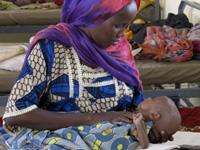MSF Calls for Increased Deployment of Assistance to Stem Alarming Child Malnutrition
Geneva/New York, June 14, 2010 – People living in the Sahelian belt of Chad are facing one of the worst nutrition crises in recent years. The international medical humanitarian organization Doctors Without Borders/Médecins Sans Frontières (MSF) is calling for a faster and larger deployment of humanitarian assistance to meet the needs of the most vulnerable populations, particularly children under the age of five.
Several factors, including erratic rainfall, failed harvests, soaring food prices, early depletion of food stocks, and poor access to healthcare, have contributed to increased rates of malnutrition. In the Hadjer Lamis region, recent rapid nutrition screenings show that over five percent of children less than five years of age are suffering from severe acute malnutrition and are at risk of dying. An estimated 5,000 children in Hadjer Lamis alone are in urgent need of nutritional assistance.
“We are very worried about the number of severely malnourished children that our medical teams are seeing – close to 3,000 children were admitted to our programs in the month of May,” said Dr. Benoit Kayembe, MSF emergency medical coordinator in Chad.
This current rise in malnutrition is especially alarming since it coincides with the beginning of the “hunger season.” More children are at risk of becoming severely malnourished in the coming weeks, until the next expected harvest in October.
National authorities and local and international agencies have initiated a response to the severe food security crisis. Despite these efforts, there are still many communities not receiving food and nutritional assistance. MSF calls for an accelerated and expanded emergency response in all affected areas to meet the needs of the most vulnerable, especially children under five, whose nutritional needs are especially acute.
MSF is currently implementing emergency nutrition interventions in the Hadjer Lamis, Batha, Guéra, Salamat, and Quaddai regions, as well as in the capital N’Djamena. Activities include in-patient and ambulatory therapeutic feeding centers and targeted food distributions to over 60,000 children in the coming weeks.
Chad is not the only country facing a malnutrition crisis. Most countries located in the Sahel region are experiencing increasing rates of childhood malnutrition. MSF has also already begun operating emergency nutrition programs—and reinforcing existing ones—in Niger, Mali, Burkina Faso, and Sudan.
MSF recently launched “Starved for Attention," a major, global multimedia campaign to highlight the crisis of childhood malnutrition and how increased childhood sickness and death can be prevented with effective nutrition interventions: www.starvedforattention.org
MSF has been working in Chad since 1981. The organization is providing medical assistance to resident and displaced populations in Abéché, Adé, Kerfi, and Dogdoré, as well as to refugees from the neighboring Sudanese region of Darfur and from Central African Republic. MSF has also intervened in Chad in response to medical emergencies, such as measles and meningitis outbreaks.




